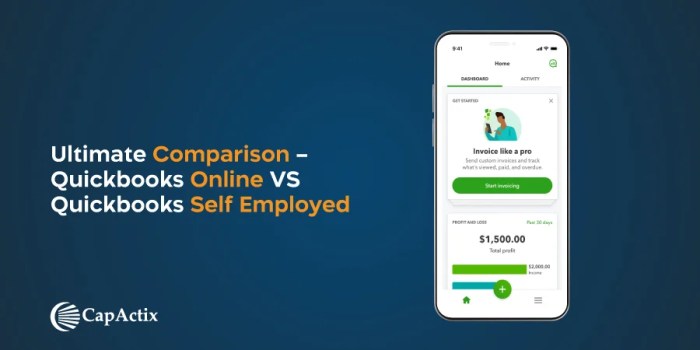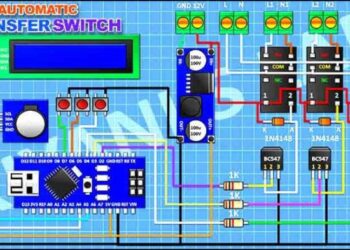Exploring the differences between QuickBooks Self Employed and Traditional Accounting Software sheds light on the unique features and functionalities each offers. Let's dive into this detailed comparison to help you understand which option may be best suited for your accounting needs.
In the following sections, we will delve into various aspects such as target users, key features, pricing models, user experience, integration capabilities, customer support, security measures, and more to provide a thorough analysis.
Overview of QuickBooks Self Employed and Traditional Accounting Software
QuickBooks Self Employed is a cloud-based accounting software designed specifically for freelancers, independent contractors, and self-employed individuals to manage their finances efficiently.Traditional accounting software, on the other hand, refers to more comprehensive accounting systems used by businesses of all sizes to handle complex financial tasks such as payroll, inventory management, and tax compliance.
Main Features of Traditional Accounting Software:
- Ability to handle multiple users and large volumes of data.
- Integration with various business functions like inventory management and CRM.
- Advanced reporting capabilities for financial analysis.
- Customizable features to suit specific business needs.
Differentiating QuickBooks Self Employed from Traditional Accounting Software:
- QuickBooks Self Employed is more user-friendly and geared towards individuals with simpler financial needs.
- Traditional accounting software offers more advanced features and scalability for larger businesses.
- QuickBooks Self Employed focuses on basic bookkeeping and tax tracking, while traditional software covers a wider range of financial functions.
- Traditional accounting software requires more training and expertise to use effectively, compared to the intuitive interface of QuickBooks Self Employed.
Target Users
QuickBooks Self Employed is designed for freelancers, independent contractors, and small business owners who need a simplified accounting solution tailored to their specific needs. It is ideal for those who want to track business expenses, manage invoices, and easily separate personal and business finances.
QuickBooks Self Employed Users:
- Freelancers and independent contractors
- Small business owners with simple accounting needs
- Individuals looking for an easy-to-use accounting software
Traditional Accounting Software Users:
Traditional accounting software is typically used by larger businesses, accounting firms, and companies with complex financial needs. It caters to users who require advanced features such as inventory management, payroll processing, and detailed financial reporting.
User Demographics:
| QuickBooks Self Employed | Traditional Accounting Software |
|---|---|
| Primarily freelancers and small business owners | Larger businesses and accounting firms |
| Users looking for a simple, user-friendly interface | Users needing advanced features and customization |
| Typically self-employed individuals | Often employed by larger organizations |
Key Features and Functionality
When comparing QuickBooks Self Employed with traditional accounting software, it's essential to understand the key features and functionalities that set them apart.
Key Features of QuickBooks Self Employed:
- Automatic mileage tracking for easy expense management.
- Separation of personal and business expenses to simplify tax filings.
- Invoices and estimates creation to streamline billing processes.
- Integration with bank accounts for real-time financial data updates.
- Quarterly tax estimates to help freelancers stay on top of their tax obligations.
Functionalities Offered by Traditional Accounting Software:
- Comprehensive financial reporting for detailed analysis of business performance.
- Inventory management to track stock levels and streamline ordering processes.
- Payroll processing capabilities to manage employee salaries and benefits.
- Customizable chart of accounts for tailored financial tracking.
- Advanced budgeting and forecasting tools for long-term financial planning.
Differences in Features:
QuickBooks Self Employed focuses on simplifying accounting tasks for self-employed individuals, with a strong emphasis on tax management and expense tracking. On the other hand, traditional accounting software offers a wider range of functionalities catering to businesses of all sizes, including inventory management, payroll processing, and advanced financial reporting.
User Experience and Interface
QuickBooks Self Employed offers a user-friendly experience with a simple and intuitive interface designed specifically for self-employed individuals. The software is easy to navigate, making it accessible for users with varying levels of accounting knowledge.
QuickBooks Self Employed
- The user experience of QuickBooks Self Employed is streamlined and efficient, allowing users to easily track income and expenses, categorize transactions, and generate reports.
- The interface is clean and organized, with key features such as invoicing, mileage tracking, and tax estimation prominently displayed for quick access.
- Users can access the software from any device with an internet connection, providing flexibility and convenience for managing finances on the go.
Traditional Accounting Software
- Traditional accounting software often has a more complex interface, with multiple tabs, menus, and options that can be overwhelming for users who are not familiar with accounting principles.
- The design of traditional accounting software is geared towards professional accountants and finance professionals, requiring a higher level of expertise to navigate effectively.
- While traditional accounting software offers robust features and customization options, the learning curve can be steep for self-employed individuals who may not have a background in accounting.
Comparison
- QuickBooks Self Employed prioritizes simplicity and ease of use, making it ideal for self-employed individuals who need a straightforward solution for managing their finances.
- Traditional accounting software caters to more complex accounting needs and is better suited for businesses with dedicated accounting staff or professionals who require advanced financial tools.
- In terms of user interface and experience, QuickBooks Self Employed excels in providing a user-friendly platform that simplifies accounting tasks for self-employed individuals, while traditional accounting software may offer more features but with a steeper learning curve.
Pricing and Subscription Models
When it comes to choosing accounting software, pricing and subscription models play a crucial role in decision-making. Let's dive into how QuickBooks Self Employed and traditional accounting software differ in terms of their pricing structures.
QuickBooks Self Employed Pricing
QuickBooks Self Employed offers a simple pricing structure with a monthly subscription fee. Users can choose between different plans based on their needs, such as the Self-Employed plan or the Self-Employed Tax Bundle. The pricing is transparent and allows users to budget effectively without any surprises.
Traditional Accounting Software Pricing
Traditional accounting software typically charges users based on a licensing model
Cost Comparison
- QuickBooks Self Employed: Offers a monthly subscription fee starting at $15 per month, making it affordable for self-employed individuals and small businesses.
- Traditional Accounting Software: Can cost hundreds or even thousands of dollars upfront, depending on the software provider and the features included.
- Overall, QuickBooks Self Employed proves to be a cost-effective solution for freelancers and small business owners, offering competitive pricing and a range of features without the hefty upfront investment required by traditional accounting software.
Integration and Compatibility
When it comes to managing your finances effectively, integration and compatibility play a crucial role in streamlining processes and ensuring a seamless experience. Let's explore how QuickBooks Self Employed and traditional accounting software stack up in terms of integration capabilities.
Integrations Available for QuickBooks Self Employed
QuickBooks Self Employed offers a range of integrations to help users connect their financial data with other tools and platforms. Some of the key integrations include:
- Integration with bank accounts to automatically import transactions.
- Integration with popular payment platforms like PayPal and Square for easy tracking of income.
- Integration with tax preparation software to simplify tax filing processes.
Compatibility of Traditional Accounting Software with Other Tools
Traditional accounting software may not always offer as many integrations as QuickBooks Self Employed, but they are often compatible with a variety of tools depending on the specific software. Some common compatibility options for traditional accounting software include:
- Integration with CRM systems to sync customer data with financial records.
- Compatibility with payroll software for seamless management of employee wages and benefits.
- Integration with inventory management systems for accurate tracking of stock levels and costs.
Comparison of Integration Capabilities
In terms of integration capabilities, QuickBooks Self Employed stands out for its user-friendly and well-rounded options that cater to the needs of self-employed individuals. On the other hand, traditional accounting software may offer more specialized integrations tailored to specific industries or business needs.
It ultimately comes down to the user's preferences and requirements when choosing between the two options.
Customer Support and Resources
When it comes to customer support and resources, both QuickBooks Self Employed and traditional accounting software offer assistance to their users. Let's delve into the details of the support options provided by each software solution.
Customer Support for QuickBooks Self Employed
- QuickBooks Self Employed provides customer support through various channels such as phone, email, and live chat.
- Users can access a comprehensive knowledge base with FAQs, guides, and tutorials to troubleshoot issues independently.
- There is also a community forum where users can interact with each other and seek advice.
- For more personalized assistance, users have the option to schedule one-on-one sessions with a support agent.
Customer Support for Traditional Accounting Software Users
- Traditional accounting software users typically have access to customer support through phone and email.
- Some software providers may offer live chat support or in-person training sessions for an additional fee.
- Resources such as user manuals, online forums, and video tutorials are usually available to help users navigate the software.
- Users may also rely on third-party consultants or accountants for technical support and guidance.
Comparison of Support Levels
QuickBooks Self Employed generally offers more extensive and diverse customer support options compared to traditional accounting software. The availability of live chat, one-on-one sessions, and a vibrant community forum enhances the overall user experience and ensures that users can find help quickly and efficiently.
Security and Data Protection
When it comes to managing sensitive financial information, security and data protection are crucial factors to consider. Let's dive into the security measures in place for QuickBooks Self Employed and the data protection protocols of traditional accounting software.
Security Measures in QuickBooks Self Employed
- QuickBooks Self Employed uses bank-level encryption to secure data transmission.
- Multi-factor authentication adds an extra layer of security to user accounts.
- Regular security updates and patches are applied to protect against potential vulnerabilities.
- Automatic data backups ensure that your information is safe and accessible in case of any unforeseen events.
Data Protection Protocols of Traditional Accounting Software
- Traditional accounting software often requires manual backups to external drives or servers to protect data.
- Data is stored locally on the user's device or on on-premises servers, which may pose a higher risk of data loss or theft.
- Access controls and user permissions are typically managed by the user or system administrator.
- Updates and security patches may be less frequent compared to cloud-based solutions like QuickBooks Self Employed.
Comparison of Security Features
| Security Aspect | QuickBooks Self Employed | Traditional Accounting Software |
|---|---|---|
| Encryption | Bank-level encryption for data transmission | Dependent on user's security measures |
| Authentication | Multi-factor authentication | Manual user access controls |
| Data Storage | Cloud-based storage with automatic backups | Local storage requiring manual backups |
| Security Updates | Regular updates and patches | Less frequent updates |
Conclusive Thoughts

In conclusion, QuickBooks Self Employed and Traditional Accounting Software each have their strengths and weaknesses. By weighing the factors discussed in this comparison, you can make an informed decision on which accounting software aligns better with your requirements and preferences.
General Inquiries
What makes QuickBooks Self Employed unique compared to traditional accounting software?
QuickBooks Self Employed is specifically designed for freelancers and independent contractors, offering simplified invoicing, expense tracking, and tax tools tailored to their needs.
How does the pricing structure of QuickBooks Self Employed differ from traditional accounting software?
QuickBooks Self Employed typically offers a subscription-based model with monthly fees, while traditional accounting software often involves one-time purchases or annual licenses.
Are there any specific user demographics that benefit more from traditional accounting software?
Traditional accounting software is commonly utilized by larger businesses and organizations that require advanced financial reporting and inventory management features.












